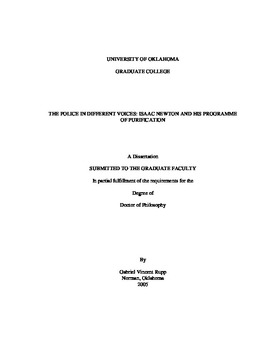| dc.contributor.advisor | Mair, David, | en_US |
| dc.contributor.author | Rupp, Gabriel Vincent. | en_US |
| dc.date.accessioned | 2013-08-16T12:19:53Z | |
| dc.date.available | 2013-08-16T12:19:53Z | |
| dc.date.issued | 2005 | en_US |
| dc.identifier.uri | https://hdl.handle.net/11244/904 | |
| dc.description.abstract | This work positions Isaac Newton's three areas of inquiry---Natural Philosophy, alchemy, and theology---as three inter-locked "literacies, " each with its own corrupt text and purifying method of reading. Newton's natural philosophical literacy, a method of purifying reading the book of nature, is driven by coded concepts, including crypticity, Oneness, and purification, drawn from Newton's heretical Christianity. Those concepts also drive his interactions with the Royal Society and his contemporary Enlightenment scientists. Newton's alchemical literacy, a transmutative method of reading the book of self, is expressive of both Newton's will to superiority and his ambivalent and complex placement of the female in his system of representation. Newton's theological literacy, a purifying method of reading scriptures, employs a hermeneutics using criteria of Enlightenment science to purge scripture of idolatrous complexity. That theological literacy Newton extends to the world of politics in his work at the London mint, where he purifies the mint of inefficiency and the underworld of counterfeiters. Newton's overall method of working in seemingly opposed systems of representation is juxtaposed to Niels Bohr's "Unity of Knowledge, " with both demonstrating a Kierkegaardian "dance of the absurd" in their productive use of contradiction. However, Bohr's complementarity accounts for and goes beyond the limits of Newton's approach. Employing Bohr's complementarity as meta-epistemological frame, Walter Benjamin's method of constellation, Werner Heisenberg's uncertainty principle, and Kurt Godel's incompleteness theorem are positioned as three post Enlightenment responses to Newton's characteristics of science outlined in his "Rules of Reasoning." Mutually exclusive yet interdependent, these epistemological complementarities are framed as possibilities for construction of a human(e) science. | en_US |
| dc.format.extent | x, 242 leaves : | en_US |
| dc.subject | History of Science. | en_US |
| dc.subject | Newton, Isaac, 1642-1727 Knowledge Alchemy. | en_US |
| dc.subject | Language, Rhetoric and Composition. | en_US |
| dc.subject | Philosophy. | en_US |
| dc.subject | Newton, Isaac, 1642-1727 Criticism and interpretation. | en_US |
| dc.title | The police in different voices: Isaac Newton and his programme of purification. | en_US |
| dc.type | Thesis | en_US |
| dc.thesis.degree | Ph.D. | en_US |
| dc.thesis.degreeDiscipline | Department of English | en_US |
| dc.note | Adviser: David Mair. | en_US |
| dc.note | Source: Dissertation Abstracts International, Volume: 66-05, Section: A, page: 1750. | en_US |
| ou.identifier | (UMI)AAI3176317 | en_US |
| ou.group | College of Arts and Sciences::Department of English | |
